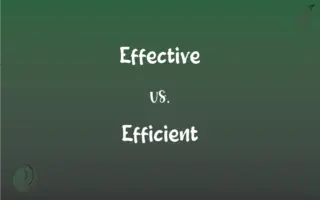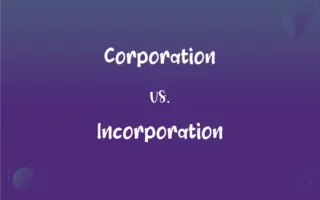Police vs. Cop: What's the Difference?
Edited by Aimie Carlson || By Janet White || Published on January 23, 2024
"Police" refers to the organized civil force for maintaining law and order, while "cop" is an informal term for an individual police officer.

Key Differences
The term "police" is a formal designation referring to the collective body responsible for law enforcement and maintaining public order. "Cop," on the other hand, is an informal, colloquial term used to refer to an individual police officer. This distinction highlights the difference between the institution and its members.
"Police" encompasses the entire system, including its rules, regulations, and organizational structure. In contrast, "cop" specifically refers to a person in the role of a police officer, without implying the larger system's structure or function. This reflects the broader scope of "police" compared to the more personal and individual focus of "cop."
In terms of usage, "police" is preferred in formal and official contexts, such as legal documents and official reports. "Cop," however, is often used in everyday conversation and can carry various connotations, ranging from neutral to either respectful or derogatory, depending on the context and tone.
The term "police" also conveys a sense of collective action and authority, representing the entire force as a unit. "Cop," as an individual reference, can sometimes humanize the role, focusing on the person rather than the institution. This difference can affect public perception and the portrayal of law enforcement in media and popular culture.
"Police" is a universally recognized term, used internationally with similar meanings in different countries. "Cop," however, is more specific to certain English-speaking regions and may not be as widely understood globally. This linguistic variation reflects cultural differences in referring to law enforcement officials.
ADVERTISEMENT
Comparison Chart
Definition
Formal term for law enforcement body
Informal term for individual police officer
Scope
Refers to the entire force or system
Refers to a single officer
Usage
Used in formal, official contexts
Common in casual, everyday speech
Connotation
Generally neutral and official
Varies; can be neutral, respectful, or derogatory
Recognition
Universally recognized and used
More specific to English-speaking countries
ADVERTISEMENT
Police and Cop Definitions
Police
The official organization responsible for maintaining public order and safety.
The police were called to manage the traffic accident.
Cop
A colloquial term used for members of the police force.
The cop on duty handled the situation calmly.
Police
A body of officers representing the civil authority of government.
The police department launched a community outreach program.
Cop
An informal reference to an individual law enforcer.
A cop visited the school to talk about road safety.
Police
A government force authorized to regulate and control public behavior.
The police patrolled the area during the festival.
Cop
A slang term for a police officer.
The cop directed traffic at the busy intersection.
Police
Law enforcement agents tasked with preventing crime and enforcing laws.
The police quickly responded to the burglary report.
Cop
A street-level law enforcement officer, informally referred to.
The cop issued a speeding ticket to the driver.
Police
The collective term for individuals trained in law enforcement.
The police played a key role in ensuring public safety.
Cop
A casual designation for a person employed in policing.
The cop in the neighborhood is well-known for his community engagement.
Police
A body of government employees trained in methods of law enforcement and crime prevention and detection and authorized to maintain the peace, safety, and order of the community.
Cop
A police officer.
Police
A body of persons with a similar organization and function
Campus police. Also called police force.
Cop
One that regulates certain behaviors or actions
"Faced with the world recession of the early 1980s, ... the World Bank ... became a stern economic taskmaster and cop" (Richard J. Barnet).
FAQs
Can "police" refer to a single officer?
Typically, "police" refers to the collective force rather than an individual.
What does "police" refer to?
"Police" refers to the formal law enforcement body of a government.
Is "cop" an official term?
No, "cop" is an informal, colloquial term for a police officer.
Do "police" and "cop" have different connotations?
Yes, "police" is neutral and official, while "cop" can vary in connotation.
Are the duties of a "cop" different from the police force?
No, a "cop" performs the same duties as any other police officer.
Does "police" include detectives and other specialized roles?
Yes, "police" encompasses all roles within the law enforcement system.
Can "cop" be used in legal documents?
It's more appropriate to use "police" in legal and official documents.
Is it appropriate to use "cop" in formal writing?
Generally, "police" is preferred in formal contexts.
Is "police" used internationally?
Yes, "police" is a universally recognized term.
Does "police" only refer to officers on patrol?
No, it includes all members of the law enforcement system.
Is "cop" a slang term?
Yes, it's a slang term for a police officer.
Do "police" have different roles in different countries?
Yes, the specific roles and functions can vary by country.
Is "cop" considered disrespectful?
It can be, depending on context and tone, but it's often used neutrally.
Are "police" and "cop" interchangeable?
They can be, but their use depends on formality and context.
Is "cop" used in all English-speaking countries?
It's widely used, but its popularity varies by region.
Do the "police" only work in crime-related situations?
No, they also work in public safety, traffic control, and community services.
Can "cop" be used for both male and female officers?
Yes, "cop" is gender-neutral.
Can a "cop" hold different ranks?
Yes, "cop" can refer to officers of various ranks within the police force.
Is the image of "police" and "cop" the same in popular culture?
Not always; popular culture can portray them differently based on context and narrative.
Are "police" involved in community outreach?
Yes, many police forces engage in community outreach and programs.
About Author
Written by
Janet WhiteJanet White has been an esteemed writer and blogger for Difference Wiki. Holding a Master's degree in Science and Medical Journalism from the prestigious Boston University, she has consistently demonstrated her expertise and passion for her field. When she's not immersed in her work, Janet relishes her time exercising, delving into a good book, and cherishing moments with friends and family.
Edited by
Aimie CarlsonAimie Carlson, holding a master's degree in English literature, is a fervent English language enthusiast. She lends her writing talents to Difference Wiki, a prominent website that specializes in comparisons, offering readers insightful analyses that both captivate and inform.






































































